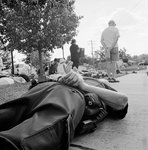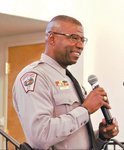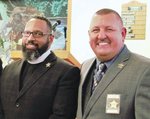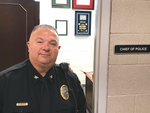




PITTSBORO — In the wake of the death of George Floyd at the hands of Minneapolis Police, leaders of three predominantly African-American churches in Chatham County met last week with leaders of the three primary Chatham law enforcement departments to open a dialogue on police reforms in Pittsboro.
The meeting focused on what the agencies have done so far and how they plan to move forward to improve relations between law enforcement and communities of color.
The roundtable discussion was facilitated by Pittsboro Commissioner and Mayor Pro-Tem Pamela Baldwin. Elected leaders from Pittsboro, Siler City, Goldston and Chatham County attended using Zoom technology.
“We are all concerned about the death of George Floyd,” Baldwin said as she opened the forum, “We understand we as a community have to work together.”
The Rev. Ricky Frazier, the presiding elder of 24 AME Zion Churches in the region, asked what reforms the police departments have been put in place following the death of Floyd. Siler City Chief Mike Wagner was the first law enforcement officer to speak, stating that his department already implemented six of the eight actions that the group was requesting.
The eight actions was a reference to “Eight Can’t Wait,” a list of measures created by a nonprofit group following the death of Michael Brown at the hands of Ferguson, Missouri, police officers in 2014. These include banning choke-holds and strangleholds, requiring deescalation, require warning before shooting, exhaust all other means before shooting, duty to intervene, ban shooting at moving vehicles, require use of force continuum which is a set of requirements governing what kinds of weapons can be used versus what levels of resistance and require comprehensive reporting.
Wagner noted that what happened to Floyd was “outside the guidelines of any officer” and that the choke-hold restraint method isn’t taught to be used except for when an “officer was in a struggle and had no other means to protect himself.”
Chatham County Sheriff Mike Roberson said many of the reforms had been in place in his department for years; he said a choke-hold is the “same as shooting a gun.”
Roberson said he hears “a lot of pain” in the community.
“I hear a mother asking me, ‘Is my son going to be safe?’” he said. “I can say I feel like he would be, but I don’t have the answer to make the mom feel better.”
Chatham County Sheriff’s Office Deputy Chief Charles Gardner, who handles accountability and all complaints for the department, spoke of that same fear. Gardner grew up in Ferguson.
“I can tell you things that happened to me as a black man,” Gardner said. “Every time there’s an incident, whether it’s here or not, it opens a wound.”
Gardner said he handles every complaint personally, calling the individual so that the person “knows that the complaint has been handled” and that he is “doing the right thing.” Gardner and Roberson note that the use of body cams, helps with accountability. In the Sheriff’s Office, every officer has a body cam including detention officers. Pittsboro Interim Chief Clarence “Shorty” Johnson said that all of his officers also have body cams as well as in-dash cameras. Wagner said that while all of Siler City’s patrol cars have cameras, the department has a limited number of body cams so not all of his officers have them “because of the cost.”
Rev. Charles Mathews, Pastor of the Union Grove AME Zion Church in Bear Creek, used an analogy about a track meet to describe the challenges in the community: the white man starts first and gets to run 10 laps; then the white woman starts, running another 10 laps. Then the black man starts; and 10 laps later, the black woman. Mathews said African-Americans are “so far behind” because they are “having to come against years and years” of struggle, “carrying the scars and wounds of racial injustice” because “my African-American body, my mind, is not equal.”
Read Rev. Mathews open letter to law enforcement by clicking here.
Roberson said he has been “diversifying the force” because of the “cross cultures and cross needs” of Chatham County. One third of the Chatham County Sheriff’s Office is female and 11 percent is black, but Roberson wants that number to be more in line with the 13-percent African-American representation in the county.
“We need to figure out how to catch up the 10 laps,” Roberson said. “We’re not getting a lot of black males applying. We’re having a problem getting them in the door. That’s where we’ve got to start.” Roberson said there had been challenges in recruiting prior to now saying “we’re reaching out, but we’re still not getting the traction that I’m happy with.” He asked for suggestions as to how to get more black and Hispanic males into law enforcement saying he would “sponsor” their Basic Law Enforcement Training.
“We need people in leadership,” Roberson said. “I need them coming in the door now.”
Frazier asked Wagner about what he learned about race relations during his time in law enforcement in Virginia, where he was a member of the Albemarle County Sheriff’s Office, and what changes he had made since taking the position as Siler City’s Chief to “help with race relations here.” Wagner said that in addition to serving on boards and working with churches, noting “the demographics of Siler City are very diverse.”
“Pastors are a key source of information,” Wagner said. “If I don’t hear them then I can’t address them.”
The purpose of the dialogue was not meant to be “an accusatory meeting,” Mathews said, but more about community engagement. Johnson said that “community policing,” a philosophy of policing that has a foundation in meeting the community, community engagement and partnerships, has been in use at the Pittsboro Police Department for years, starting under former Chief Percy Crutchfield.
Roberson noted in addition to community policing, it’s important to hire officers that are able to live where they work. He said officers live in the communities in which they work, they may “police someone on one day,” then have to “see them in the grocery store a day later.” That community connection depends on police “being able to afford to live where they work.”
Rev. Corey Little, pastor of Mitchell’s Chapel AME Zion Church in Pittsboro, recalled a story when stopped for an issue with a vehicle registration as a youth and had his car impounded “for no other reason than to exert power.” He was only released from custody because a member of the family was a member of the local sheriff’s office.
“Today I can recall the experience as if it happened last week,” Little said. “I remember it vividly and emotionally — the fear and anxiety.”
Little, who said that every time he “sees that badge, it strikes deep rooted fear” and “re-traumatizes” him. On the other hand, he noted that his relationship with Gardner, who is also a member of his church, and Roberson, who will attend his services as well, is the “closest that I have come to law enforcement in a community.”
“We have an amicable relationship without any reservation rising to the surface,” Little said. “But that takes a lot of time.”
Mathews said that “too few departments meaningfully involve the community” and that there needs to be a level of transparency and external assessment of engagement. He asked the departments to “be willing to use your privilege” and “be willing to learn.” He proposed creating an “intergenerational committee” with citizens and law enforcement.
All the law enforcement officials agreed to continue the conversation.
Roberson said he wanted to “bridge that experience” of African-American and Hispanic youth with law enforcement. Asking the pastors if “there is something we can design” for the “generations coming up who are experiencing this.”
“I want to be a part of that change, I will take you up on that,” Frazier said adding he believed there needed to be change “to make sure this doesn’t happen in this community.”
Perhaps the divergence between race and law enforcement was best summed up by Gardner.
“You’re at the middle of a crossroad,” Gardner said. “I wear this uniform and my heart goes out to that family. It was wrong and I can’t make that right. When you wear that uniform, you gotta find the balance. My skin is just as sensitive as any other whose skin is black. I got into law enforcement to make a difference. Any one man can make a difference. These talks don’t need to just be in this room, it needs to go outside these doors. It’s going to take all of us.”
Casey Mann can be reached at CaseyMann@Chathamnr.com.